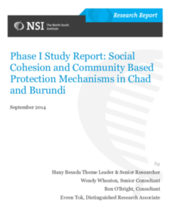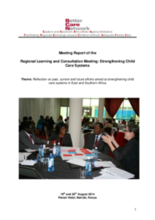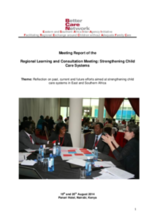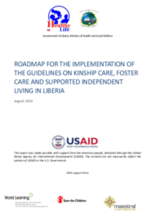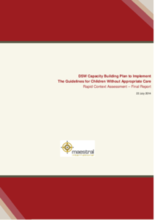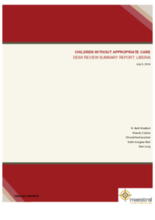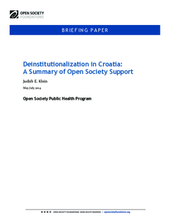Displaying 671 - 680 of 1025
This research explores links between child protection and peacebuilding. It includes a section examining community child protection mechanisms in Burundi.
This Masters thesis paper, by Michael Maher King of the University of Oxford, reviews the situations of children in institutional alternative care in Israel and Japan.
Following a consultative mapping, a regional learning meeting took place on 19-20 August 2014 in Nairobi, Kenya. The theme of this meeting was "Reflection on past, current and future efforts aimed at strengthening child care systems in East and Southern Africa."
This report provides an overview of a two-day regional consultancy on strengthening child care systems in Eastern and Southern Africa.
This article analyses the interactions among global and national actors in the policy dynamics of Cambodia’s National Social Protection Strategy (NSPS); it is intended to disentangle the complex politics of global social policy at the national level.
This “roadmap” document outlines the recommended implementation strategies and activities for strengthening family- and community-based alternative care in Liberia. It accompanies the Guidelines on Kinship Care, Foster Care and Supported Independent Living (the Guidelines) and the Capacity Building Plan to Implement the Guidelines (CBP).
This Context Assessment, produced by Maestral International, aims to collect and review all relevant information to support the development of the Department of Social Welfare’s (DSW) institutional capacities to execute the new framework for alternative care in Liberia.
This report provides an overview of Liberia’s alternative care context, identifies key stakeholders who are involved in the child protection field in the country, and summarizes the Child Care Legal and Policy Framework related to alternative care.
The Heads of State of the Caribbean region endorsed the Call to Action to end the placement of children under three years of age in residential care institutions at the 35th CARICOM conference.
This paper examines the benefits and challenges of de-institutionalizing disability residential services in Croatia through Open Society Foundation’s Mental Health Initiative (MHI).

